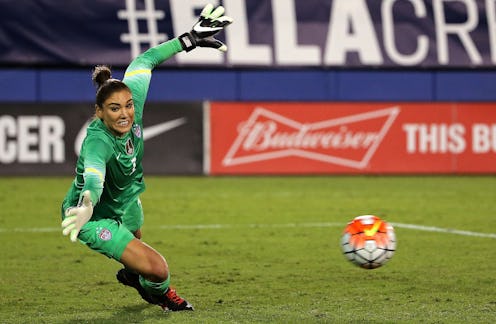News
Top U.S. Female Soccer Players Seek Equal Pay
On Thursday, five key U.S. women's soccer players filed a federal complaint over wage discrimination. They all play for the women's national soccer team — the reigning World Cup champion and winner of Olympic gold in 2012. Despite their overwhelming success on the field, the players claim that U.S. Soccer, the sport's governing body in the United States, pays them less than their male counterparts.
The players took their claim to the Equal Employment Opportunity Commission, the federal agency in charge of enforcing civil rights claims in the workplace. They asked for an investigation into U.S. Soccer and why the organization pays its women players as little as 40 percent of what men on the national team earn. Budget figures were released last month which show the women are underpaid on everything from bonuses to appearance fees to per diems.
Five players filed the complaint, but any ruling would apply to the entire team. The team's co-captains, Carli Lloyd and Becky Sauerbrunn, were named with Alex Morgan, Megan Rapinoe, and goalkeeper Hope Solo in the complaint. Four appeared on the Today show on NBC Thursday morning to make their case. Lloyd told Matt Lauer:
I think that we've proven our worth over the years. Just coming off of a World Cup win, the pay disparity between the men and women is just too large. And we want to continue to fight.
The difference is substantial, especially when you look at how a winning women's team is paid in comparison to a losing men's team. At the 2015 World Cup, the women's team won and took home $2 million in prize money ,which was distributed among the players. That same year, the men's team took home $9 million. The winning men's team, Germany, took home $35 million.
The women's team has won the last three Olympic gold medals and three World Cup titles. The U.S. men's national team has never won either. The complaint alleges that they also take home about $20 million more in revenue than the men's team, which really makes the pay differences hard to swallow. It's not just tournament bonuses, either. If the men's team wins 20 friendly matches (the minimum both teams are required to pay each year), they get $263,320. The women's team? Just $99,000 — less than the men get for losing every game.
Solo said on Today that it boiled down to equality and respect:
In this day and age, it's about equality. It's about equal rights. It's about equal pay. We're pushing for that. We believe now the time is right because we believe it's our responsibility for women's sports and specifically for women's soccer to do whatever it takes to push for equal pay and equal rights. And to be treated with respect.
This is the latest escalation in the team's fight for equal pay. U.S. Soccer sued the national women's team's union in February to try to keep the current collective bargaining agreement valid through the end of 2016. That would prevent the team from going on strike before or during the 2016 Olympics in Rio over equal pay. The last agreement expired in 2012, but U.S. Soccer says it was renewed. The union disagrees.
The players' lawyer, Jeffrey Kessler, also told Lauer that the women are disappointed with U.S. Soccer. "When they asked for the same treatment as the men, they were told it was irrational. Now, that might be a good answer in 1816. It's not an acceptable answer in 2016."
U.S. Soccer responded to the EEOC complaint in a statement: "While we have not seen this complaint and can’t comment on the specifics of it, we are disappointed about this action. We have been a world leader in women’s soccer and are proud of the commitment we have made to building the women’s game in the United States over the past 30 years."
The complaint can not address all the bargaining positions of the union. For example, the players object to playing on AstroTurf because of safety concerns. It can, however, pressure U.S. Soccer to equalize pay. Both the men's and women's teams have collective bargaining agreements, but their respective terms are very different.
One factor outside of U.S. Soccer's control is that FIFA, the sports governing body worldwide, pays U.S. Soccer significantly more money for the men's team's participation in the World Cup. But there are other revenue factors, such as sponsorships and television contracts, that the women's team can ask for.
It is unknown how long it will take for the EEOC to review the complaint. If they side with the players, it could seek a negotiated settlement or side with the players in federal court. Back pay would apply, which could amount to millions of dollars for the players. The U.S. women's team could have quite the year. They could win both equal pay and a gold medal.
